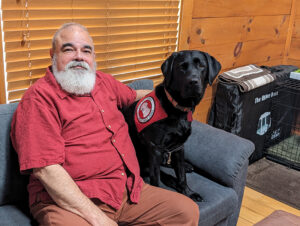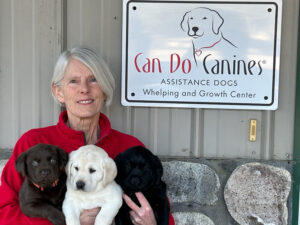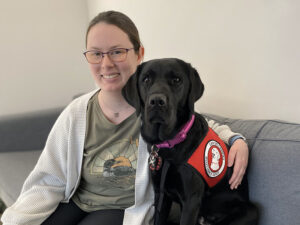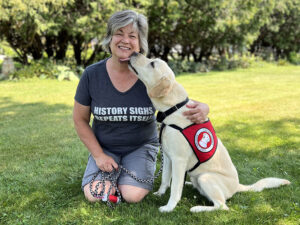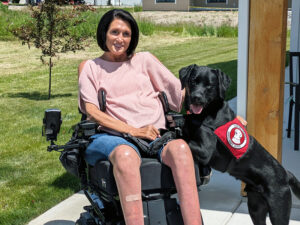A day in the life of a dog in final training at Can Do Canines is anything but boring. The power of routine, combined with the care and attention of our dedicated kennel staff and trainers, lays the groundwork for an environment of learning, safety, and, of course, fun! Planning for a dog’s move into the kennel begins weeks in advance. The team reviews feedback forms from volunteer handlers. Kennel Manager Katie Rickert shares, “It’s very important information for us to view how they live in a home. How do they live with other dogs? Do they prefer to eat …
News
Gwen Brings New Hope to Gabrielle’s Life
About five seizures a week for three straight years. That’s what Gabrielle experienced from a non-epileptic seizure disorder, brought on by Chronic Lyme Disease in late 2020. “It has affected my daily life, emotionally, physically, and socially, and has made me not able to work or go to school,” she says. She feared going anywhere in public, not knowing when a seizure would strike. And although she was able to move out of her family’s home last May, that transition wasn’t bringing her the desired comfort. She explains, “Every day there was a fear of me falling or having seizures …
Lulu Helps This Veteran Live Life in Color
By Mike Branch – War veteran. Army Medic. Paratrooper. Field soldier. Thirty-two years of intense military service, including four wars, have left Will Cruz with injuries “from head to toe,” including a traumatic brain injury and PTSD. When Will finally retired from the U.S. Army in 2012, he wanted only three things: a wood shop, a home near school, and a dog. Will heard about Can Do Canines through a web search. “I looked for ADI organizations near me and Can Do Canines popped up.” Living in New Hope at the time, he considered Can Do Canines an obvious choice, …
Karin Balgaard’s Legacy Will Nurture Future Breeding Program
Many people are familiar with the saying, “A mother’s work is never done.” But what about the people who take care of mothers? Karin Balgaard has been taking care of our mama dogs since she began as a volunteer in early 2014. Currently, she is relishing her last deliveries before she retires in April. Estimating that she has helped bring over 95 litters of Can Do Canines puppies into the world, she says, “The wonder of it all just increases.” The wonder of all Karin has done has continued to increase over the years, too. She accepted a part-time position …
Yarrow Offers Kelsi Healing, Courage, and Love
According to Greek mythology, the white flowers on the yarrow plants symbolize healing, courage, and love. Kelsi, who was recently matched with Mobility Assist Dog Yarrow, believes that Yarrow’s name is fitting. Although their partnership is just beginning to bloom, Kelsi states that “Yarrow already provides me with all of this and more.” Kelsi is a graduate student pursuing her Masters of Arts in Occupational Therapy. She also lives with symptoms of what is known in the medical world as the “trifecta,” which includes Ehlers-Danlos syndrome (EDS), postural orthostatic tachycardia syndrome (POTS), and mast cell activation syndrome (MCAS), as well …
Meet Our Four New Board Members
Within the past couple of months, we have welcomed four new members to our Board of Directors: Maha Brauch, Roy Hosek, Joy Johnson-Lind, and Heather Leide. These four are joining our other board members to bring the total number of board members to 15, not including Jeff Johnson. We are excited about the knowledge and experience they bring to the group! Maha Brauch – Maha is a dedicated and accomplished professional with over a decade of experience in the credit union industry, where she has been a steadfast advocate for the not-for-profit philosophy that prioritizes member well-being over profits. Currently …
Nigel is on the Clock for Beth
“I basically woke up one day and couldn’t hear,” says Beth, who experienced sudden hearing loss in her 30’s. “I actually worked at a doctor’s office at that point and had somebody check my ears. Unfortunately, it was an OB/GYN office, and nobody there knew how to diagnose and treat it. If it had been caught quickly, she might have regained her hearing, “but I didn’t know that and no one I worked with knew that apparently.” In the approximately 20 years since then, Beth has also developed a hereditary, progressive hearing loss. “Without my hearing aids, there’s very little …
Yul Brings New Light to Tara’s Life
“My days look a lot brighter with having the support of Yul by my side,” says Tara, who received Mobility Assist Dog Yul in mid-2024. Yul is not Tara’s first assistance dog, though, but her fourth. Tara was just 17 when a car accident caused a spinal cord injury. This resulted in a permanent loss of strength, sensation, and function. “It affects my daily living,” says Tara. At age 20, nearly 30 years ago now, Tara was certified with her first assistance dog. Since then, she has had three Golden Retriever assistance dogs from another agency. When number four became …
Wylla Inspires Talia Beyond Words
“We don’t give up. We don’t teach that,” says Angela, the mother of six children. She remembers thinking this when she and her husband, John, were faced with overwhelming odds related to a series of difficult diagnoses given to their youngest child, Talia, years ago. Talia was born with hypotonia (a condition of low muscle tone), methylmalonic acidemia (a metabolic disorder), and a progressive neurodegenerative disease. Although Talia likes to play outside and in the water, paint, and color with chalk, John says, “We started to see her less interested in things.” Plus, adds Angela, “We wanted Talia to be …
Happy Holidays
Happy Holidays from everyone at Can Do Canines! As we wrap up another fantastic year full of tail-wagging moments and puppy love, we just wanted to take a moment to express our gratitude for your incredible support. You make our mission possible, and we can’t wait to embark on more exciting adventures together in the new year! Before our amazing pups head off to their cozy host homes for a well-deserved holiday break, they tried their paws at some fun magic tricks! Check out their adorable antics in the video here. We promise it will bring a smile to your …



